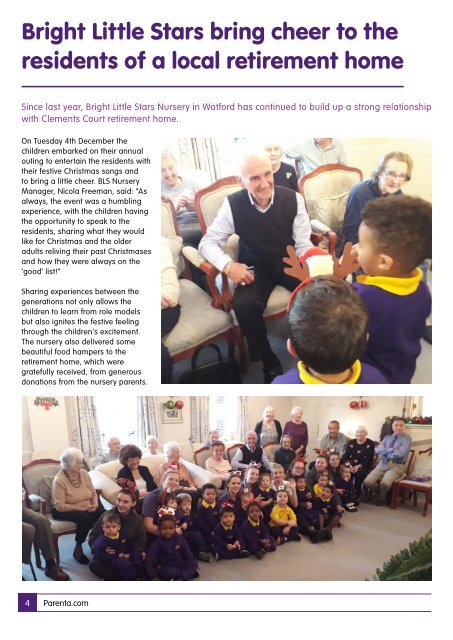You also want an ePaper? Increase the reach of your titles
YUMPU automatically turns print PDFs into web optimized ePapers that Google loves.
Bright Little Stars bring cheer to the<br />
residents of a local retirement home<br />
New research to study why more men<br />
don’t work in early years education<br />
Since last year, Bright Little Stars Nursery in Watford has continued to build up a strong relationship<br />
with Clements Court retirement home.<br />
On Tuesday 4th December the<br />
children embarked on their annual<br />
outing to entertain the residents with<br />
their festive Christmas songs and<br />
to bring a little cheer. BLS Nursery<br />
Manager, Nicola Freeman, said: “As<br />
always, the event was a humbling<br />
experience, with the children having<br />
the opportunity to speak to the<br />
residents, sharing what they would<br />
like for Christmas and the older<br />
adults reliving their past Christmases<br />
and how they were always on the<br />
‘good’ list!”<br />
Men currently only make up around 2% of the UK’s early years education staff – and this is a<br />
figure which has not changed for several decades.<br />
The Economic and Social Research<br />
Council at Lancaster University, have<br />
funded a new study to get a better<br />
understanding of the barriers men<br />
face when taking up employment in<br />
early years settings.<br />
The team, led by Dr Jo Warin, from<br />
the University’s Educational Research<br />
department, will work with the<br />
Fatherhood Institute to find solutions<br />
which can help the early years<br />
education (EYE) workforce to diversify<br />
most effectively.<br />
Sharing experiences between the<br />
generations not only allows the<br />
children to learn from role models<br />
but also ignites the festive feeling<br />
through the children’s excitement.<br />
The nursery also delivered some<br />
beautiful food hampers to the<br />
retirement home, which were<br />
gratefully received, from generous<br />
donations from the nursery parents.<br />
The GenderEYE (Gender<br />
Diversification in Early Years<br />
Education) team will work with<br />
EYE professionals in four English<br />
locations, who are interested in<br />
boosting the number of men working<br />
in early years, and who take part<br />
in supporting the ‘Men in the Early<br />
Years’ regional networks.<br />
The research team will also work<br />
with professionals from Norway,<br />
which has the highest percentage<br />
of males working in EYE (around<br />
10%). Norway has a ‘gender equality<br />
action plan’ which strives to increase<br />
the percentage of males working in<br />
childcare settings to 20%.<br />
The focus of the research will be on<br />
best practice recruitment, support<br />
and retention.<br />
GenderEYE attended a knowledge<br />
exchange at Queen Maud University<br />
College, Trondheim, the leading<br />
organisation preparing teachers for<br />
roles in early years education. The<br />
team will share their learning with<br />
colleagues and set up eight different<br />
settings for their case studies.<br />
The team will also create a survey<br />
targeting a bigger sector to get<br />
more data on male recruitment and<br />
retention.<br />
Dr Warin said to Psych.org: “The<br />
study will provide a much-needed<br />
evidence-base for understanding<br />
what men’s contribution is, and what<br />
it could be.”<br />
“There’s a growing sense that the UK<br />
needs to rethink its approach on this:<br />
the lack of gender-diversity in our<br />
EYE workforce has been allowed to<br />
go unchecked for too long. We hope<br />
that by focusing on what’s worked in<br />
Norway, we can develop some clear,<br />
achievable strategies for accelerating<br />
the pace of progress,” said Dr<br />
Jeremy Davies from the Fatherhood<br />
Institute.<br />
From the knowledge exchange<br />
event, initial findings suggest that<br />
with government support and a<br />
little effort, the success seen in<br />
Norway could, slowly and steadily<br />
be replicated, leading to a change<br />
of direction and improvement in the<br />
number of males in our own EYE<br />
workforce.<br />
Key points from the event:<br />
• Norway has a big equality<br />
plan which includes everything<br />
from paternal leave and free<br />
childcare, to ways to remove the<br />
gender-pay-gap and their target<br />
is to increase males in EYE to<br />
20%.<br />
• Government funding was<br />
designed especially for the<br />
purpose of supporting male<br />
recruitment at a local and<br />
regional level.<br />
• The importance of strong<br />
leadership and the advantages<br />
of a mixed-gender workforce<br />
was emphasised.<br />
• Retention can be improved with<br />
good support and networking<br />
opportunities for male<br />
practitioners.<br />
4 Parenta.com <strong>January</strong> <strong>2019</strong> 5

















